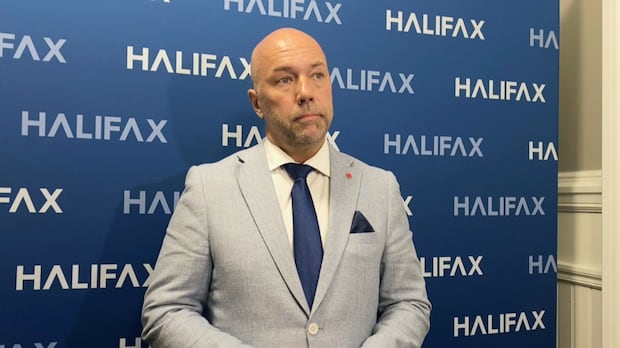Halifax councillors decry 'misinformation' from mayor, saying it undermines public trust
Mayor, CAO say changes are needed to 'clarify' their roles within the municipal structure
Some Halifax councillors say Mayor Andy Fillmore's comments about the roles of mayor and the city's top bureaucrat are disconcerting and amount to "misinformation."
Mayor Fillmore has said the current municipal structure is blocking him from fixing issues he was elected to work on, like traffic congestion and affordability.
To address that, Fillmore told CBC's Maritime Noon on Tuesday he would welcome so-called "strong mayor powers" if granted by the province, which would allow him to hire and fire the chief administrative officer for Halifax.
"The CAO holds the power. In our organizational chart, I report to the CAO," Fillmore said.

But multiple councillors — and the current CAO — immediately refuted that statement.
"I think it's always unfortunate when people spread misinformation, particularly someone who's supposed to be a trusted public figure," Coun. Patty Cuttell said Thursday.
"It confuses the public. And I think it drives polarization and really does a disservice to the governance of our city."
In an email sent Wednesday to the mayor and council, obtained by CBC News, CAO Cathie O'Toole said she wanted to offer "factually correct information" on the issue, saying she had been contacted by multiple people about Fillmore's comments.
"The mayor is part of regional council. The CAO reports to mayor and council, per the employment contract. The mayor does not report to the CAO. The CAO does not 'hold the power' — mayor and council do," O'Toole wrote.
If a CAO is not carrying out regional council's priorities and direction, O'Toole said, they can be fired with, or without cause, "relatively quickly."
Cuttell said the new mayor and council, who were all elected in the October 2024 municipal election, are in the midst of setting their strategic priorities for 2026-2030. She said that is the opportunity for the mayor, or any councillor, to bring up an important issue that can be baked into policies and plans for years to come.
Coun. Janet Steele said she was "very surprised and disappointed" to hear Fillmore's comments. She said they came with "implied criticism" of O'Toole, who she said has been a strong and effective public servant.
"The CAO is there to speak truth to power. They are to provide us with fearless advice," Steele said.
"That is why I'm so opposed to the concept of strong mayor power. If the CAO is hired exclusively by the mayor … then we won't be receiving the best advice. We may be receiving that council advice that goes through a filter that the office of the mayor uses."
Steele, a first-term councillor, said she does not understand why Fillmore doesn't understand the structure of municipal government after working as a Halifax planner for years before jumping to federal politics.
Premier Tim Houston has said the province is exploring whether strong mayor powers make sense for Halifax, because there is a "serious disconnect" between council decisions being made and the desires of citizens.
Houston and the municipal affairs minister have not said what those powers might entail. The model is used across the United States, and the recent Ontario approach allows mayors to set a budget and make decisions without a majority of council.
"I think it's really unfortunate that we're having all this drama over this issue. And I feel like we've been hijacked a bit by the mayor and by the premier weighing in," Steele said.
When asked about the training new mayor and councillors receive, a spokesperson with the Halifax municipality said there was an orientation period following the October 2024 election which included an overview of roles, responsibilities and governance.
The orientation included a two-day session last November led by the province's Department of Municipal Affairs and supported by municipal staff.
"Either the mayor is not understanding his job, or he's deliberately misleading people, and either one is terrible," said Coun. Kathryn Morse.
Other councillors, including Deputy Mayor Tony Mancini and Coun. Sam Austin, said Thursday they appreciate the independence of the CAO's office and are concerned about Fillmore's comments causing public confusion.
Austin and Steele said Fillmore should issue a public retraction of his comments about the CAO's role.
CBC News asked to speak with O'Toole and Fillmore Thursday.

Instead, O'Toole and Fillmore said in a joint statement released Thursday evening that they welcome "healthy debate" and are committed to working together with council and staff to put the needs of Halifax residents first.
The statement said that "governance clarity is essential," and while the CAO does report to regional council, the Halifax organizational chart shows the Office of the Mayor under the CAO's business unit.
The mayor's office includes various employees and staff members, and a recent advertisement said the office was hiring for a policy advisor, communications co-ordinator, and council relations and community liaison position.
"We agree that further revisions to the organizational chart are required to clarify appropriate relationships between mayor, council and administrative accountability without compromising the democratic mandate of the mayor and council in the municipal structure," the statement said.
In her email to council, O'Toole said that historically the mayor's office budget fell under the CAO's unit with the other offices related to "city hall/administration" because of the preference of previous mayors.
O'Toole said the administration "has not been curtailing or limiting anything the mayor's office has been trying to do."
She suggested that as of Sept. 1, 2026, the mayor's office should be shown as a separate and independent office in the organization chart similar to the city's auditor general, to "remove any possible friction or perception of friction between the CAO's office and mayor's office."
"Regardless of whether strong-mayor powers proceeds or not, this will clarify accountability and align with how some other Canadian cities structure their organization," O'Toole wrote.


